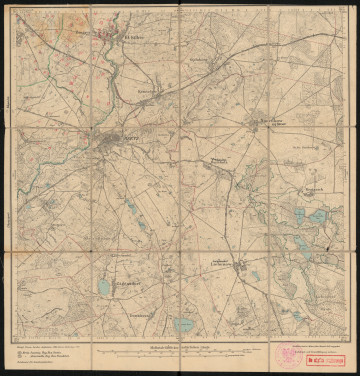
1331 Reetz II
National Museum in Szczecin
Part of the collection: Archival maps
The map is an appendix to the index of toponyms, which was developed as part of the project initiated by Pomeranian linguist, Dr Robert Holsten (1862-1954), with the aim to collect and compile contemporary folk and archive names of natural and anthropogenic physiographic objects, as well as inhabited and uninhabited places collected with local queries. The Meßtischblatt topographic maps at a scale of 1:25 000 are characterised by a very high level of detail and accuracy in mapping the topography of the terrain.
The 768 Caseburg I map was drawn and published in 1886, revised in 1911, and reprinted in 1927. It covers the areas surrounding Caseburg (Kaseburg), Kreis Usedom-Wollin, Reg. Bez. Stettin, Prov. Pommern, today Karsibór, part of Świnoujście, city with district rights, West Pomeranian Voivodeship, Poland. It is the only surviving copy of the pre-war topographic map marked with the sheet number 768, containing data on the location of objects and their names in the Flurnamen Sammlung archive. The printed map features a hand-drawn layer with the numbers of physiographic objects connected to the localities of Garz, Camminke (Kamminke); Friedichsthal (today: Paprotno (this one and next one – parts of Świnoujście); Klüß (today: Klicz); Werder (today: Ognica); Caseburg (Kaseburg); Woitzig (today: Osiecze).
Andrzej Chludziński
Author / creator
Dimensions
cały obiekt: height: 49 cm, width: 52 cm
Object type
Messtischblatt
Technique
manual script, one-color printing, black
Material
fabric, paper
Origin / acquisition method
acquisition
Creation time / dating
Creation / finding place
Owner
Muzeum Narodowe w Szczecinie
Identification number
Location / status